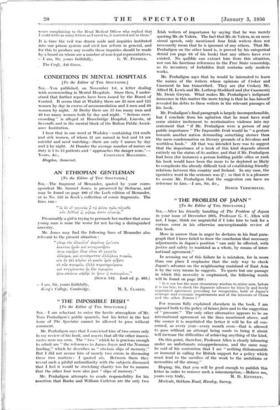"THE IMPOSSIBLE IRISH" [To the Editor of THE SPECTATOR.]
Sta,—I am reluctant to enter the hectic atmosphere of Mr. Tom Penhaligon's public quarrels, but his letter in the last issue of The Spectator cannot be allowed to pass without comment.
Mr. Penhaligon says that I convicted him of two errors only In my review of his book; and asserts that all the other inaccu- racies were my own. The " two " which he is gracious enough to admit are "the references to James Joyce and the Norman landing," which he describes as "obvious slips of memory." But I did not accuse him of merely two errors in discussing these two matters : I quoted six. Between them they reveal such a pitiful unfamiliarity with the subjects discussed that I feel it would be stretching charity too far to assume that the other four were also just "slips of memory."
Mr. Penhaligon attempts to evade responsibility for his assertion that Burke and William Carleton are the only two Irish writers of importance by saying that he was merely quoting Mr. de Valera. The fact that Mr. de Valera, in an occa- sional speech, only mentioned four Irish writers does not necessarily mean that he is ignorant of any others. That Mr. Penhaligon on the other hand is, is proved by his categorical denial (on page 64 of his book) that any others have ever existed. No quibble can extract him from this situation, nor can his facetious references to the Free State censorship, as its inventory of forbidden fruit contains only modern works.
Mr. Penhaligon says that he would be interested to learn the names of the writers whose opinions of Croker and Casement he has transcribed. They are (for Croker) Mr. Alfred H. Lewis and Mr. Lothrop Stoddard and (for Casement) Mr. Denis Gwynn. What makes Mr. Penhaligon's indignant innocence in this matter the more trying is that he has himself revealed his debts to these writers in the relevant passages of his book.
Mr. Penhaligon's final paragraph is largely incomprehensible, but I conclude from his agitation that he must have read some sinister incitement to recriminative violence into my statement that if Mr. Penhaligon were a person of any public importance" The Impossible Irish would be "a gesture towards another nation demanding something sterner than the mere condemnation on literary grounds of a frivolous and worthless book." All that was intended here was to suggest that the importance of a book of this kind depends almost entirely on the status of its author, and that if Mr. Penhaligon had been (for instance) a person holding public office or rank his book would have been the more to be deplored as likely to complicate the already difficult task of establishing friendly relations between this country and Ireland. In any ease, the operative word in the sentence was if ; so that it is a pleasure to assure Mr. Penhaligon that the suggestion can have no reference to hitn.—I am, Sir, &c., DEREK VERSCHOYLE.










































 Previous page
Previous page